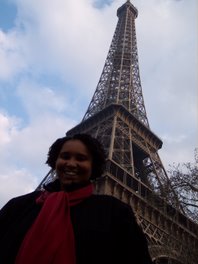ASSIGNMENTS: Note—In addition to the journal topics below, you must also add three author interviews and a self-discovery activity (please see syllabus description).
Final exam is on a separate sheet and is open book, open notes.
Journal topics. Answers should be thoughtful and avoid excess summarization of the readings (number of handwritten pages indicated are a minimum). You should provide specific examples from the activities and readings covered. If turned in after the end of the course, typed copies should be submitted as you will need to send those electronically.
Saturday, 12-30 and Tuesday, 1-2. In TWO pages, give your general impressions of the African and Arab immigrant neighborhoods of Paris. Does Beyala give an accurate description of Belleville and Paris in her novel? Explain. How do these neighborhoods compare with immigrant communities you have seen in the United States? Are there problems evident here? Any positive observations? During this visit, did you at anytime feel you stood out as a “foreigner”. Explain.
Sunday, 12-31. ONE page. Choose one exhibit at the Musée Dapper and explain your impressions of the art form. Are you surprised by the representation? Even if you are inexperienced at art appreciation, study closely the object and describe the message it conveys through its shapes, lines, colors, forms, materials, etc.
Tuesday, 1-2. In TWO pages, consider these questions during the lecture of anthropologist, Paul Vieille:
a) The notion of community has precise meanings but it is often used in a generic way that reveals nonetheless ideological undertones (i.e. communitarianism). Explain.
b) How is the French term “communauté” defined? An the English term “community”?
And communitarianism?
c) The Western state and communities: What is the relationship between secularism and community? How is the Lebanese state defined?
d) In terms of class struggle, what is the role of community?
e) At what point do notions of identity and community resurface in French society? Explain.
f) Is the suburban population divided into communities? What societal relationships are characteristic of this population?
Wednesday, 1-3: In TWO pages, comment on the following: From what you learned by visiting the Mosque, what would you say is the biggest obstacle hindering the total acceptance of the Muslim community into traditional French society? What needs to be done to overcome such an obstacle and do you foresee a solution in the near future? What do the two communities have in common? In your opinion, should France recognize polygamous marriages in the Muslim community and should co-wives and children be eligible for the same government benefits as monogamous couples? Explain.
AND
In TWO pages, comment on the following: Look at the outside of the Institut du Monde Arabe and give your interpretation of the architectural style and message of its design. (Be sure to look at the windows closely from the inside looking out as well). Once you have entered, choose one exhibit in the institute and give your impressions of the object, similar to what you had done at the Musée Dapper.
AND
In TWO pages, elaborate on the words of Madeleine Aba, her relationship as a Parisian with her Algerian writer / husband, Noureddine Aba since the 1940s, and their sense of activism as a couple.
Thursday, 1-4 and Sunday, 1-7. In ONE page, discuss how the prevalence of African and Middle Eastern dance in Paris adds to the cultural landscape of the city. What did you personally learn from these two sessions?
Friday, 1-5: The MacVal was opened a year ago, the first modern art museum in the suburbs and the first of its kind to celebrate ALL artists with some connection to France (through birth, immigration, expatriate status, etc.) In TWO pages, explain the importance of a museum like the MacVal in the suburbs, and find one exhibit that particularly relates to the theme of this course and explain that piece of art.
AND
Author interview with Etel Ednan.
Saturday, 1-6: In TWO pages, describe the findings of your self-discovery activity. (You will also present this to the class today).
AND
Author interview with Evelyne Accad.
Sunday, 1-7: In ONE page, tell what draws this diverse group of worshippers to this church and describe your own observations of the interactions of the congregation.
Monday, 1-8: In TWO pages, compare what you hear in the media and in the city about the perceptions of the youth of the ‘banlieue’ and what actually goes on in the housing developments as explained by the activists running the Women’s Association of Franc-Moisin.
Tuesday, 1-9: In THREE pages, and after having used the same set of questions for all three schools, compare and contrast the student reactions to your questions. Do you believe that the immigrant students you have witnessed at the schools have integrated well into French life? Does it seem that some immigrants have integrated better than others? What accounts for such differences, in your opinion? Compare the students’ perspectives of the immigrant experience and multiculturalism at Lycée Paul Valéry, ETSL, and Lycée Louis-le-Grand. Do you believe social class influences the opinions of students? Choose at least one interesting comment from each group of students and discuss your personal reaction to each.
Friday, 1-12: Author interview with Thérèse Kuoh-Moukoury.
Saturday, 1-13: In TWO pages, explain if you notice any differences between the Asian neighborhood and the Arab and African neighborhoods. In France and in other Western cultures, it has been said that Asians are the “privileged minority”. While Westerns see this as a “compliment”, Asians are often insulted by this appellation. Explain.
Sunday, 1-14: In ONE page, give your general impressions of the course experience. What was your favorite part of the course? What was surprising to you? Did you have any opinions before the trip that have changed with this experience? Did you find Francophone literature to be vastly differ from Western European or American literature or how is it the same?






No comments:
Post a Comment